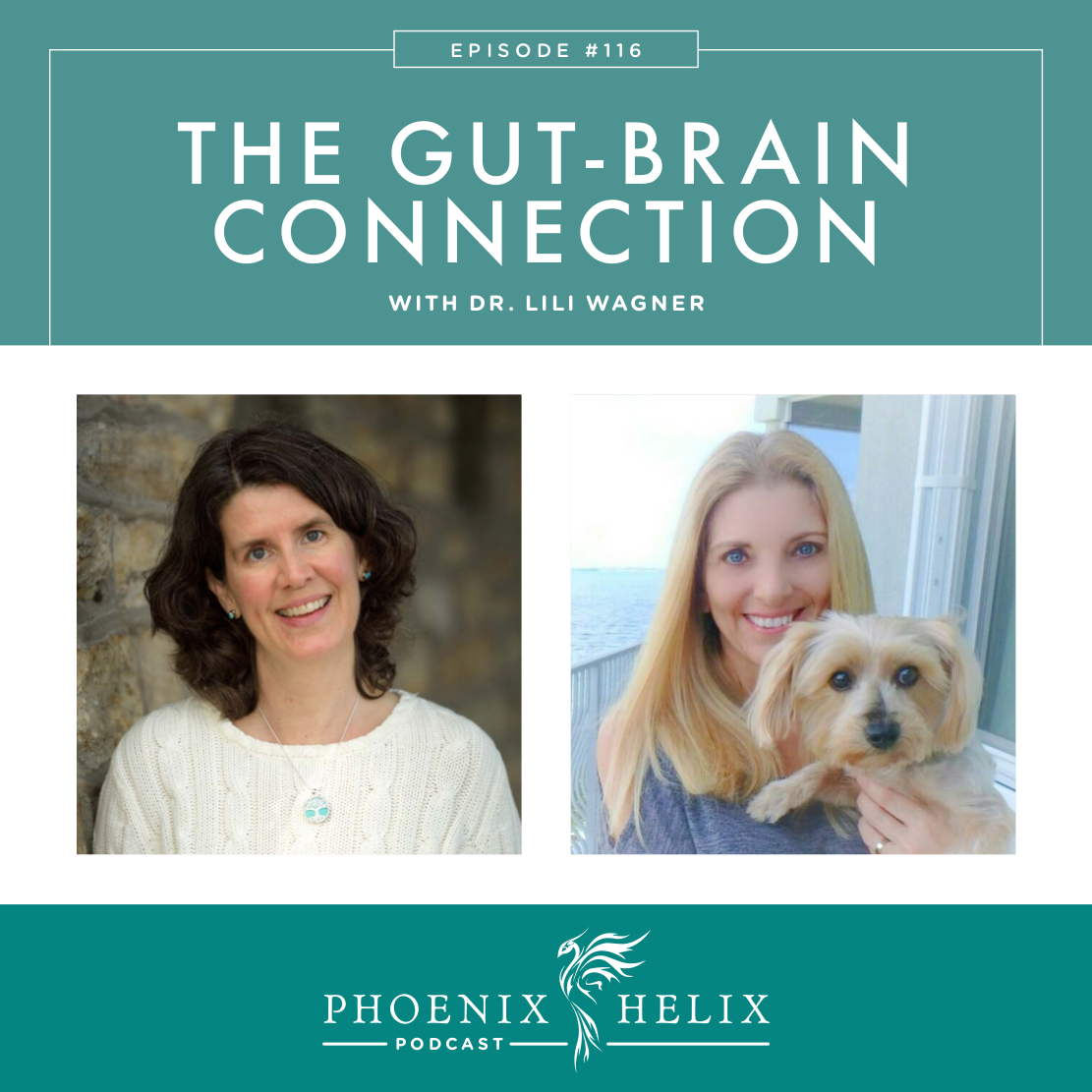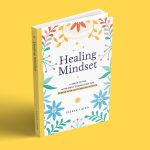
The Intimate Connection Between Mental Health and Gut Health
Have you ever felt butterflies in your stomach when you were nervous? Or lost your appetite when you were deeply grieving? We’ve all felt emotions in our gut – there’s even the common saying “gut feeling.” In fact, the more relaxed and content we feel when we eat, the better we digest our food. But did you know the gut-brain connection also goes the other way? That the food we eat can impact how our brain functions? Inflammation in the gut can result in brain fog, mood swings, and even mental health disorders. In this podcast, we talk about the science behind this connection, and how we can harness it for our health – both mental and physical. My guest is Dr. Lili Wagner, a psychologist who specializes in this intersection between diet, lifestyle, digestion, and mental health.
Listen to the Show
- Subscribe to my podcast through your favorite podcast app: iTunes, Stitcher, Google, TuneIn, Spotify, Amazon, etc.
- You can also listen to the episode right here through the player below, and if you subscribe to my newsletter you’ll get notified of future episodes.
Podcast: Play in new window | Download
Show Notes
- Intro (0:00)
- Thank You to Our Podcast Sponsor – Paleo on the Go (2:24)
- A frozen meal delivery service, 100% of their menu is compliant with the elimination phase of the paleo autoimmune protocol (AIP). They have over 5o items, including entrees, side dishes, broth, AIP-friendly bacon, and desserts.
- Use the code PHOENIX for 10% off your first order.
- Meet Dr. Wagner (3:38)
- Dr. Lili Wagner has a doctorate in psychology, a master’s degree in psychopharmacology, and almost 20 years of experience treating patients. She’s also trained in nutrition, is an AIP certified coach, and has 3 autoimmune diseases herself: ulcerative colitis, Raynaud’s disease, and seronegative spondyloarthropathy.
- As a child, she always had health problems, including digestive troubles, frequent illness, and lots of antibiotic use. She was 24 years old when she was diagnosed with ulcerative colitis, but the doctor never explained it was an autoimmune disease. She took the prescribed medication for just a few weeks before stopping. Her symptoms worsened until she was going to the bathroom over 10 times a day, with serious pain, weight loss, and blood loss. She ended up in the hospital in need of blood transfusions, and was prescribed sulfasalazine and IV prednisone at the same time. This got her symptoms under control, but came with a host of side effects. Her parents started feeding her liver to address her severe anemia. As she began to feel better, she tapered off her medications, and used the probiotic VSL#3 to manage ulcerative flares going forward. (Note: the original VSL#3 formula is now sold under the name Visbiome.)
- She received her second diagnosis at age 46. She had experienced joint and tendon pain throughout her life, but thought is was a result of her athletic pursuits and dismissed it as normal “wear and tear”. Then, while on vacation in 2015, she experienced a sudden increase in joint pain, beginning with her knee and spreading body-wide. The pain was extreme and disabling, so she went to a rheumatologist who diagnosed her with seronegative spondyloarthropathy. (Her tendons were getting attacked by her immune system.) She was put on three medications: sulfasalazine, prednisone, and methotrexate. Seeking alternatives, she turned to the internet and learned about the paleo autoimmmune protocol. Within 3 months of going AIP, she saw enough improvement in her health that she was able to taper off her medications again. She is currently medication-free.
- The lifestyle measures that make the biggest difference for her include meditation, learning to say no, the daily stoic, humor, inspirational podcasts, and learning to listen to (instead of ignore) her body’s signals.
- The Science of the Gut-Brain Connection (13:00)
- It’s bi-directional, meaning it goes both ways. There is communication from the gut to the brain, and the brain to the gut.
- Microbiome: Research is showing that the ecosystem that lives in our GI tract has a major influence on not only gut health, but brain health as well.
- Enteric Nervous System: Also called “the second brain”, this is the nervous system inside our gut lining, and it communicates with the brain via the vagus nerve through neurotransmitters. 90% of our seratonin and 50% of our dopamine is made in the gut (and the microbiome has an impact on this production as well).
- Immune System: 70% of our immune system resides in our gut, and if there is inflammation or infection, immune cells release cytokines into the bloodstream, and the brain responds to those cytokines.
- Neuroendocrine System: Hormones are also chemical messengers that travel between the gut and the brain, with cortisol (the “stress hormone“) being a major player. Both the brain and the gut produce and respond to hormones.
- Leaky Gut – Research shows that leaky gut (and its associated inflammation) can lead to a leaky blood-brain barrier.
- Summary article: How Your Gut Influences Your Brain.
- Diet & Mental Health (20:20)
- Because of the gut-brain connection, diet plays a major role in mood regulation, emotions, behavior, and cognition.
- High-carbohydrate diets (like the Standard American Diet) often create a mood rollercoaster – a brief mood boost followed by a mood and energy crash, which causes hunger and cravings to try to boost mood and energy levels again.
- Our microbiome changes based on what we eat and certain bacteria (that thrive on sugar) can drive food cravings.
- One of Dr. Wagner’s first psychology professors was interested in the connection between casein consumption (the protein contained in dairy) and its impact on ADHD. He counseled patients to eliminate casein for 2 weeks to see if it made a difference in behavior, and often the results were dramatic. So, from the very beginning, Dr. Wagner was fascinated by the diet-mental health connection.
- The diets she recommends most often for her patients are the GAPS Diet, the Paleo Autoimmune Protocol, and the Ketogenic Diet. But the first and most important step is to eliminate junk food from the diet. She also has patients who saw major improvements simply by going gluten-free.
- Dr. Wagner has her patients keep a food-mood-gut journal, to track how food impacts their symptoms.
- Resources:
- 4 Ways Sugar Could Be Harming Your Health.
- Nutritional Psychiatry: Your Brain on Food.
- Testimonials in the paleo community of people who experienced dramatic mental health improvements after going paleo: Angie, Sophie, Angela, Christie, and Linda.
- Thank You to Our Podcast Sponsor – Bonafide Provisions (28:23)
- Bonafide Provisions makes true, traditional bone broth – that means it gels, is certified organic, uses only grass-fed & pasture-raised bones, and it’s frozen (no preservatives or high-heat processing.) They also triple filter the water used in the broth, cook in stainless steel pots, and cool it completely before adding it to their BPA-free packaging.
- Why is bone broth highly recommended on a healing diet? Because the collagen and amino acids it contains provides an ideal food for the cells that line our intestines. This helps heal leaky gut, which in turn reduces inflammation, improves digestion, supports a healthy immune system (70% of which resides in our gut), and helps improve mental health as well (the topic of today’s podcast.) Bone broth also provides the building blocks for healthy hair, skin, nails, joints, and bones.
- They sell 4 varieties: beef, chicken, turkey, and a frontier blend which uses a combination of beef, turkey, lamb & bison bones. All of their bone broth is compliant with the elimination phase of the paleo autoimmune protocol. They also sell 6 varieties of soup, and 2 of those are AIP-Friendly: the butternut squash soup, and the chicken vegetable.
- Place an order here, and use the code PHOENIX for 20% off your first order.
- Micronutrients and Mental Health (30:37)
- Before focusing on micronutrients, it’s important to lay the foundation of good gut health, treating any underlying infections, dysbiosis, or leaky gut. Simultaneously, it’s important to address lifestyle factors, which includes stress management, psychological support, and mind-body techniques.
- Then when it comes to micronutrition, focus on food first and supplements second. A nutrient-dense diet benefits our entire body, including our brain.
- When it comes to supplements, formulas vary, and individual responses vary. Expect some trial and error. Listen to my podcast on supplements for details.
- Many mental illnesses are associated with nutrient deficiencies.
- Important micronutrients for mental health:
- B vitamins: B12 deficiency can cause depression, brain fog, and dementia. Thiamine helps with memory, mood balance, and stress resilience (and alcohol depletes thiamine). Niacin reduces anxiety and depression, and also helps with sleep. B6 regulates mood and helps prevent mental fatigue. Folate increases cognition and memory. The best food sources are liver and fatty fish.
- Vitamin D increases memory and positive mood. Many people suffer from Seasonal Affective Disorder, which is depression brought on by lack of sunshine. Sunshine is the best source in the summer, and light therapy can be helpful in the winter. It’s difficult to get vitamin D from food, but fatty fish and oysters are the exceptions.
- Magnesium improves concentration, focus, mood, stress resilience, and sleep. It also reduces cravings, anxiety, and the symptoms of ADHD. This is another nutrient that’s difficult to get through food, because our soil has become depleted. Some food sources include spinach, chard, avocado, and figs, but many people also take a supplement.
- Omega-3 fatty acids are also essential to brain and mental health. The best food sources are fatty fish, like salmon, mackerel, herring, sardines, anchovies, etc.
- Resource: Nutrient Deficiencies Linked to Mood.
- BDNF & Butyrate (40:36)
- BDNF (Brain-Derived Neurotrophic Factor) is like fertilizer for the brain, supporting the conservation and growth of nerve cells. The following things boost BDNF levels in the body: exercise, meditation, deep sleep, sunlight, fasting, and polyphenols (like those found in dark chocolate). Stress, on the other hand, depletes it.
- Butyrate is a short-chain fatty acid that reduces inflammation and helps heal leaky gut. For people who have successfully reintroduced dairy, butter is an excellent source. Our microbiome also creates butyrate when we eat fibrous and prebiotic foods (fruits and vegetables).
- Probiotics & Mental Health (42:28)
- A lot of research is being done in this area. Some of the probiotic strains that have the potential to reduce depression and anxiety are Lactobacillus acidophilus, Lactobacillus casei, Bifidobacterium bifidum, and Bifidobacterium longum. But the research is quite new, and results are likely to vary. Everyone’s microbiome is unique and is constant changing. Like all supplement trials, consider it a self-experiment.
- Resource: Psychobiotics: Best Probiotics for Mood?
- When Is Conventional Psychiatric Medication Appropriate? (45:10)
- Sometimes in the paleo community, we see things in black or white terms. If one person “cured” their mental illness through diet and lifestyle interventions, everyone should be able to do so. But it doesn’t work that way for everyone. Sometimes a combination of medication, diet, and lifestyle is what’s needed. Other times, medication can be the bridge that allows people to feel well enough to start implementing diet and lifestyle changes, and they may be able to taper off the medication later.
- There’s also this idea that we should be able to use willpower and self-discipline to manage mental health issues, and there’s stigma surrounding the labels. Remember this: you aren’t defined by a diagnosis. It has nothing to do with your worth as a human being. Mental illness can be as debilitating as physical illness. There is no shame in taking medication when needed. The goal is to live our best life, with all the tools at our disposal.
- That said, some people do experience negative side effects with these medications. This doesn’t mean that medication is bad. It means that medication is a self-experiment, too. There is usually trial and error in finding what works for each individual.
- Never stop taking mental health medications cold-turkey. That can cause severe withdrawal symptoms. Instead, taper your medication under the guidance of your psychiatrist (once you’ve begun incorporating diet and lifestyle changes).
- Resources:
- How the Brain Impacts Gut Health (50:45)
- Research shows that anti-depressants can actually improve gut health as well. This doesn’t mean everyone should get a prescription, but it shows again the powerful connection between the gut and the brain.
- Lifestyle practices also activate the gut-brain connection and can improve mental health and gut health at the same time: stress management, humor, meditation, social connection, inspirational podcasts, uplifting music, deep breathing, learning to say no, avoiding over-exercise, etc. When we relax, it stimulates the vagus nerve which connects the gut and the brain and supports healthy digestion. Conversely, stress increases leaky gut.
- Cognitive Behavioral Therapy (CBT) is a professional psychology technique that teaches us a new way to think and respond to stress, so that we are less reactive and more stress resilient.
- Brain injuries usually cause gut symptoms as well. Addressing healing at both levels is important. Psychological traumas can have a similar effect. Dr. Wagner uses a variety of techniques with clients who have experienced physical or psychological traumas, including CBT, EMDR, as well as diet and gut health interventions.
- Resources:
- Book: Healing Mindset.
- Podcasts:
- Hormones and Mental Health (1:00:23)
- For women especially, hormone imbalances can dramatically impact mental health.
- Two podcasts on this topic:
- Outro (1:00:50)
- Dr. Lili Wagner is accepting new patients and works with people around the world via Skype. You can connect with her through her website.
- Eileen (your podcast host) is the author of multiple books, written to help people thrive with autoimmune disease. Learn more on the Books Page.
- If you like this podcast, follow or subscribe through your favorite podcast app. You can also subscribe to Eileen’s biweekly newsletter.
- Check out the entire archive of podcast episodes.
You May Also Be Interested In
Spreading the Word
If you like the podcast, please leave a positive review in iTunes. It would mean the world to me, and also helps others find the podcast. Here are some quick instructions using your iPhone:
- If you are already subscribed to my podcast: (1) Click the purple podcast icon. (2) At the bottom of the screen, click Library. (3) At the top of the screen, click Shows. (4) Click the Phoenix Helix podcast image. (5) Scroll down the page, and you’ll see Ratings and Reviews. Scroll down a little bit more and click on Write a Review. This will bring up the review screen. Tap 5 stars (if you love the podcast), and then click in the title box, and it will bring up the keyboard. Enter a title and short review. (6) Click Send in the upper right corner. (7) Thank you! Positive reviews give the podcast a higher search ranking in iTunes, helping people find it and letting them know it’s a quality podcast and worth their time to listen.
- If you haven’t subscribed to my podcast: (1) Click the purple podcast icon. (2) In the lower right corner, click the magnifying class. (3) Type Phoenix Helix in the search box. (4) Click the podcast cover in the Show list. (5) If you’d like to subscribe, click the + sign at the top of the screen. (6) To write a review, scroll down the page, and you’ll see Ratings and Reviews. Scroll down a little bit more and click on Write a Review. This will bring up the review screen. Tap 5 stars (if you love the podcast), and then click in the title box, and it will bring up the keyboard. Enter a title and short review. (7) Click Send in the upper right corner. (8) Thank you! Positive reviews give the podcast a higher search ranking in iTunes, helping people find it and letting them know it’s a quality podcast and worth their time to listen.







